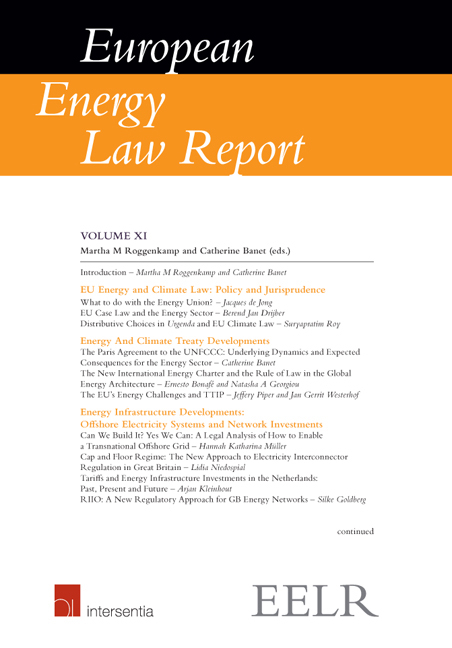Book contents
- Frontmatter
- Editorial
- Contents
- List of Abbreviations
- List of Contributors
- Introduction
- Part I EU Energy and Climate Law: Policy and Jurisprudence
- Part II Energy and Climate Treaty Developments
- Part III Energy Infrastructure Developments: Offshore Electricity Systems and Network Investments
- Chapter VII Can We Build It? Yes We Can: A Legal Analysis of How to Enable a Transnational Offshore Grid
- Chapter VIII Cap and Floor Regime: The New Approach to Electricity Interconnector Regulation in Great Britain
- Chapter IX Tariffs and Energy Infrastructure Investments in the Netherlands: Past, Present and Future
- Chapter X RIIO: A New Regulatory Approach for GB Energy Networks
- Part IV Heat Supply Legislation in the Eu
- Part V Security of Energy Supply and Safety
Chapter X - RIIO: A New Regulatory Approach for GB Energy Networks
from Part III - Energy Infrastructure Developments: Offshore Electricity Systems and Network Investments
Published online by Cambridge University Press: 29 September 2018
- Frontmatter
- Editorial
- Contents
- List of Abbreviations
- List of Contributors
- Introduction
- Part I EU Energy and Climate Law: Policy and Jurisprudence
- Part II Energy and Climate Treaty Developments
- Part III Energy Infrastructure Developments: Offshore Electricity Systems and Network Investments
- Chapter VII Can We Build It? Yes We Can: A Legal Analysis of How to Enable a Transnational Offshore Grid
- Chapter VIII Cap and Floor Regime: The New Approach to Electricity Interconnector Regulation in Great Britain
- Chapter IX Tariffs and Energy Infrastructure Investments in the Netherlands: Past, Present and Future
- Chapter X RIIO: A New Regulatory Approach for GB Energy Networks
- Part IV Heat Supply Legislation in the Eu
- Part V Security of Energy Supply and Safety
Summary
INTRODUCTION
The RIIO regulatory model–setting Revenue using Incentives to deliver Innovation and Outputs (known as ‘ RIIO’)–is a framework introduced by the Office of Gas and Electricity Markets (Ofgem) to set price controls for network companies in the GB energy market. It is intended to encourage network companies in Great Britain to secure significant investment in order to maintain reliable networks, without raising costs for the consumer.
Developed in the context of an attempt to address the challenges arising from low carbon energy goals, intermittent forms of electricity and the steady increase in energy demand, the RIIO model is designed to overcome the challenges that these changes will bring to network companies.
This chapter explains the key elements of RIIO, and recent cases related to the model together with a brief outlook of the regulatory changes ahead in the next couple of years.
BACKGROUND
THE RPI-X MODEL
Prior to the introduction of RIIO, price regulation took the form of the Retail Price Index, via a framework referred to as ‘ RPI-X’, a formula using the rate of inflation as a benchmark for permitted changes in network prices, before subtracting an efficiency factor, ‘X’.
RPI-X was designed for networks that transported power from large, centralized power stations to domestic and commercial consumers throughout the country. This method had been used since the privatization of the gas networks in 1986 and the electricity networks in 1990–91. It succeeded in reducing network costs by 50 per cent and increasing investment by £ 35 billion over the 20 years it was in force. It also improved the reliability of the network.
An investigation by Ofgem in 2010, ‘Project Discovery–Options for Delivering Secure and Sustainable Energy Supplies,’ sought to identify the key challenges both Europe and Britain's energy networks will encounter in the next 20 years. The consultation found that an alternative price controlling mechanism would be needed if the networks were to remain reliable and cost-effective as we move towards a low-carbon future. RIIO was developed as a direct result of this report.
- Type
- Chapter
- Information
- European Energy Law Report XI , pp. 207 - 220Publisher: IntersentiaPrint publication year: 2017

